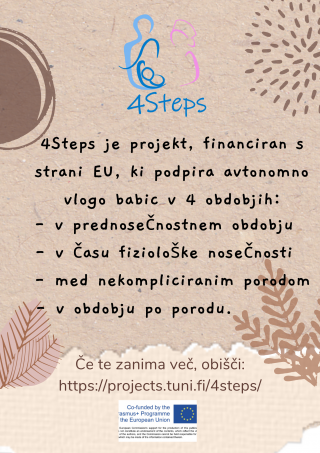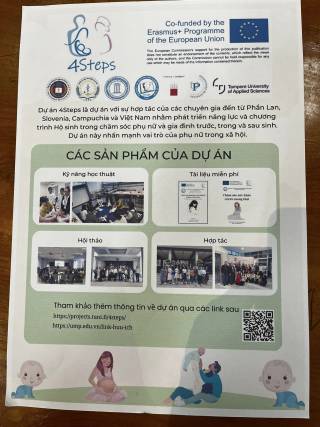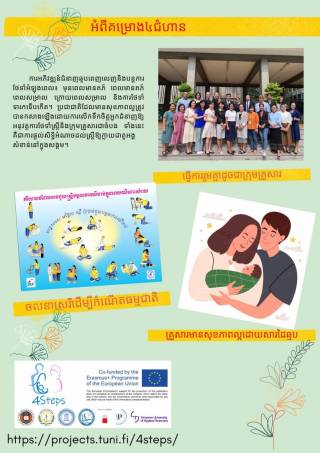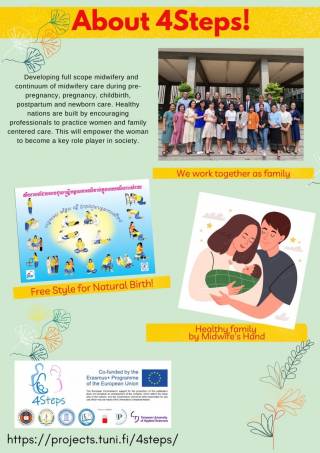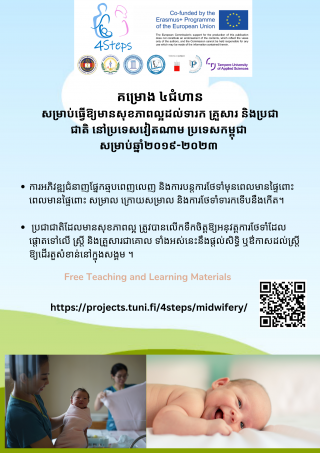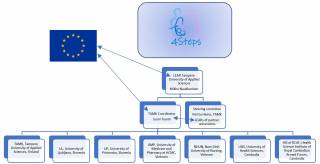Background
Developing full scope midwifery and continuum of midwifery care during pre-pregnancy, pregnancy, childbirth, postpartum and newborn care decreases maternal and infant mortality, morbidity and disabilities.
Goals
- Strengthen midwife education by developing curricula.
- Implement evidence-based theory, practices and recommendations in midwifery education and care.
- Upgrade academic and pedagogic skills of midwife educators.
- Update midwifery skills and know-how of professionals.
- Create modern socioculturally sensitive training material for professionals and families.
- Promote dignified and respectful high quality midwifery care culture.
Impact
Quality maternal and newborn care can avert a total of 83% of all preventable maternal deaths, stillbirths and newborn deaths. Healthy nations are built by encouraging professionals to practice women and family centered care. This will empower the woman to become a key role player in society.
Introducing the Lancet Series on Midwifery (See complete video by clicking here!)
In this video, the background and central findings of the Lancet Series on Midwifery is discussed. Their key finding, based on decades of research in maternity health care, is this:
“Midwifery is a vital solution to the challenges of providing high-quality maternal and newborn care for all women and newborn infants, in all countries.”
Funding
EU, Erasmus +, Capacity Building in Higher Education.
Partners and co-operators
Finland (Tampere University of Applied Sciences), Slovenia (Univerza v Ljubljani and Univerza Na Primorskem Universita Del Litorale), Vietnam (University of Medicine and Pharmacy at Ho Chi Minh City and Truong Dai Hoc Dieu Duong Nam Dinh) and Cambodia (University of Health Sciences and Health Science Institute of Royal Cambodian Armed Forces, Pnom Penh).
Here is the organization chart of the project. Click on picture (opens in a new tab) to see the larger document as a PDF. In that document is also visible the oranization charts of each university.
Theory and methodology of the project
We use expansive learning and participatory research methodology in all work packages in our project. Learning by expanding and participatory methodology is a creative type of learning in which learners join their forces to create something new. The metaphor of expansion depicts the multidirectional movement of learners reconceptualizing and transforming their activities. We all working in the project and beneficiaries are learners, we learn from each other. Learning is always in active motion. We use active learning methods like different variations of problem-based learning, case-based learning, flipped learning, a lot of simulations, groupwork etc. Target is to develop academic skills and evidence-based midwifery of participating (midwife) teachers, and students become secondary beneficiary group. We invite also stakeholders, working midwives to Evidence-based midwifery skills training.
A summary of the final evaluation of the project (ended in November 2023)
External evaluator Eija Raussi-Lehto, Manager of research and testing, D.Sc. (Tech.), MSc (Health Care), RN-Midwife
The project got off to a promising start, but the onset of the Covid-19 pandemic and subsequent lockdown in early 2020 across all participating countries threw a wrench in the initial project timeline, significantly impacting its progress. The unforeseen circumstances led all partners to unanimously agree to temporarily suspend the project until after the pandemic. In a commendable move, the EU granted a one-year extension until February 2022.
Given the multicultural nature of 4Steps, and the fact that many participants were engaging in an EU project for the first time, the endeavour proved to be more demanding than initially anticipated. Considerable time was allocated to administrative guidance, which received praise from participating countries. From an administrative point of view, it might have been good in this project if the main responsibility for all work packages had been the coordinators.
Collaborative international projects, particularly those involving multiple nationalities, were deemed invaluable. They not only fostered a deeper understanding of cultural perspectives in different countries but also presented an opportunity for personal growth. Linguistic challenges occasionally hindered progress, necessitating multiple verifications. Project managers devoted significant time to administrative guidance, and they had the task of elucidating EU financing principles to project members.
On a personal level, participants noted significant shifts in their perspectives on women’s roles, from pregnancy to aging. The project was credited with a substantial increase in knowledge, skills, and proficiency in their application. The written material generated through the project marked a significant stride in advancing the field of midwifery and in the best interests of families and women.
While policy change and curriculum implementation are not without challenges, the project has served as a catalyst for personal growth and increased knowledge. This evidence-based knowledge is seen as pivotal to passing on valuable insights to future students. As one respondent aptly put it, “the replenishment and expansion of information remains a permanent practice for the future.” When reflecting on the added value of this capacity building project for project partners, there is no doubt about its paramount importance.
Dissemination posters (2023):
